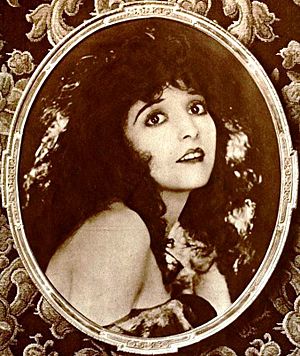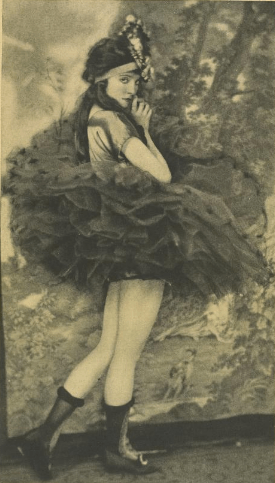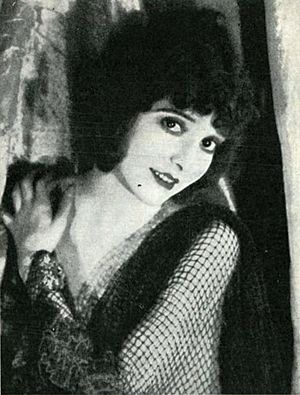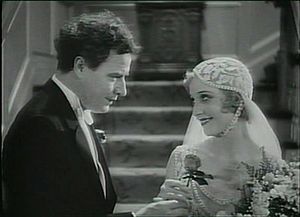Madge Bellamy facts for kids
Quick facts for kids
Madge Bellamy
|
|
|---|---|

Bellamy in Photoplay, May 1922
|
|
| Born |
Margaret Derden Philpott
June 30, 1899 Hillsboro, Texas, U.S.
|
| Died | January 24, 1990 (aged 90) Upland, California, U.S.
|
| Resting place | Forest Lawn Memorial Park, Glendale |
| Occupation | Actress |
| Years active | 1917–1946 |
| Spouse(s) |
|
| Relatives | Tom Forman (cousin) |
Madge Bellamy (born Margaret Derden Philpott; June 30, 1899 – January 24, 1990) was a famous American actress. She starred in plays and movies. Madge was a very popular actress in the 1920s and early 1930s. Her acting career became less active after the silent film era ended.
Contents
Early Life and Dreams
Margaret Derden Philpott was born in Hillsboro, Texas, on June 30, 1899. Her parents were William Bledsoe and Annie Margaret Derden Philpott. Madge grew up in San Antonio, Texas, until she was six years old. Her family then moved to Brownwood, Texas. There, her father worked as an English professor at Texas A&M.
As a child, Madge took dancing lessons. She soon dreamed of becoming a stage performer. At age nine, she made her first stage appearance. She danced in a local play called Aida.
The Philpotts later moved to Denver, Colorado. Madge met and married Carlos Bellamy in Colorado. However, they divorced when she decided to move to New York City. She wanted to follow her acting dreams. In her autobiography, she said her agent suggested she keep the name Bellamy. This was possibly to avoid talk about her divorce.
Starting an Acting Career
First Steps in New York
Just before finishing high school, Madge left home for New York City. She quickly found work as a dancer on Broadway. After dancing in a show called The Love Mill in 1917, she decided to try acting.
In 1918, she joined a traveling play called Pollyanna. She received good reviews for her performance. Madge got her big chance when she replaced Helen Hayes in a Broadway play. It was called Dear Brutus, and she acted alongside William Gillette. Madge also toured with Dear Brutus. While performing in this play, she got a small role in her first movie. It was The Riddle: Woman (1920), starring Geraldine Farrar.
After the Dear Brutus tour, Madge joined a theater group in Washington D.C. There, she acted in Peg o' My Heart. While with this group, Madge did a screen test for director Thomas H. Ince. In November 1920, she signed a three-year contract. This was with Ince's new company, Triangle Film Corporation. Madge's first movie for Triangle was The Cup of Life in 1921. She starred with Hobart Bosworth.
Becoming a Film Star
Madge Bellamy's big breakthrough role was in the 1922 film Lorna Doone. She played the main character. After this, people called her "the exquisite Madge." Artist Penrhyn Stanlaws even called her "The Most Beautiful Girl in America." She then starred in several dramatic films for Thomas H. Ince.
In 1924, Madge's contract with Ince ended. She then signed with Fox Film Corporation. She stayed with Fox for the next five years. At Fox, she appeared in two films for director John Ford. These were The Iron Horse (1924) and Lightnin'.
By 1925, Madge started having problems. She had "artistic differences" with studio bosses. That year, she refused a role in the very successful silent movie Ben-Hur. She later said her career slowed down because she wanted to act in light comedies. She preferred roles that showed off her looks, rather than more challenging parts.
In 1927, Fox executive Winfield Sheehan tried to cast her. He wanted her for the main role of "Diane" in 7th Heaven. Madge later said she was cast in the role. But she was replaced by Janet Gaynor while filming in France. Janet Gaynor later won the first Academy Award for Best Actress for that role. Instead, Madge appeared in the comedy Very Confidential. In this movie, she played a model pretending to be a famous female athlete.
In 1928, Madge starred in Fox's first part-talking film. It was called Mother Knows Best. The movie was based on Edna Ferber's novel. Madge played Sally Quail, a stage performer. Her life was controlled by her very strong stage mother, "Ma Quail" (Louise Dresser). In the musical parts, Madge pretended to be famous performers. These included Anna Held, Sir Harry Lauder, and Al Jolson.
Reviews for the film were mostly good. Critics noted that Madge's voice was a bit weak.
Challenges and Later Roles
Madge Bellamy's last silent film, Fugitives, came out in 1929. Her first full-length movie with all talking, Tonight at Twelve, was released later that year. By this time, Madge's career had slowed down a lot. This was due to some bad choices she made when she was angry. Fan magazines at the time called her "Miss Firecracker" because of her temper.
Despite her behavior, she was still quite popular. The Hollywood Association of Foreign Correspondents named her an "American Beauty." In 1929, she left her contract at Fox. She refused to star in the movie version of The Trial of Mary Dugan. This was a popular Broadway play that the studio bought just for her. (The movie was later made by Metro-Goldwyn-Mayer starring Norma Shearer). Madge later said about her career, "I got too big for my britches. I wanted too much money and when it was not forthcoming, I quit."
Madge tried to find work as an actress who was not tied to one studio. But she did not work again until 1932. Then, she started appearing in smaller, low-budget films. One of her more famous roles from this time was in the 1932 movie White Zombie. She starred opposite Bela Lugosi. The film was directed by brothers Edward and Victor Hugo Halperin.
White Zombie was a moderate success. However, it received mixed reviews. Madge's acting in it was generally criticized. (In a letter from 1970, Madge claimed her performance looked bad. She said she had lost her voice from a cold and another actress dubbed her. This has since been found to be untrue). She was supposed to be in the Halperin brothers' next film, Supernatural. But Carole Lombard was cast instead.
Personal Life and Later Years
Madge Bellamy was briefly married to a bond broker named Logan F. Metcalf. They married in Tijuana on January 24, 1928. They separated just four days later. Metcalf filed for divorce. He claimed that during their honeymoon, Madge refused to speak to him. This was because he liked eating ham and eggs, which she thought was "common." Metcalf was granted a divorce on April 25, 1928.
When Madge retired from acting, she had lost much of her money. She lost even more during the Great Depression. In her autobiography, A Darling of the Twenties, she said she lived in "extreme poverty" after retiring. However, she did own some real estate. She also owned a retail shop where she worked to support herself. In her free time, Madge wrote screenplays and novels. None of them were ever bought. In the early 1980s, she sold her retail shop for twice what she paid for it. She then lived comfortably for the rest of her life.
Madge stayed out of the public eye until the 1980s. At that time, film historians and silent film fans rediscovered her work. They started asking her for interviews. She also began attending showings of the horror film White Zombie. This movie was a moderate success when it first came out. It has since become a cult classic, meaning it has a dedicated fan base.
Madge Bellamy was a vegetarian. In her final years, she lived alone in Ontario, California.
Death
Madge Bellamy had ongoing heart problems as she got older. On January 10, 1990, she went to the San Antonio Community Hospital in Upland, California. She was there for treatment. She died there of heart failure on January 24, at age 90. She is buried at Forest Lawn Memorial Park in Glendale, California.
Her autobiography, A Darling of the Twenties, was published one month after she died.
Filmography
| Year | Title | Role | Notes |
|---|---|---|---|
| 1920 | The Riddle: Woman | Marie Meyer | Unknown/presumably lost |
| 1921 | The Cup of Life | Pain | |
| 1921 | Passing Through | Mary Spivins | Unknown/presumably lost |
| 1921 | Blind Hearts | Julia Larson | |
| 1921 | Love Never Dies | Tilly Whaley | |
| 1921 | The Call of the North | Virginia Albret | Unknown/presumably lost |
| 1921 | Hail the Woman | Nan Higgins | |
| 1922 | Lorna Doone | Lorna Doone | |
| 1922 | The Hottentot | Peggy Fairfax | Incomplete |
| 1923 | Garrison's Finish | Sue Desha | |
| 1923 | Are You a Failure? | Phyllis Thorpe | |
| 1923 | Soul of the Beast | Ruth Lorrimore | |
| 1924 | No More Women | Peggy Van Dyke | |
| 1924 | Do It Now | ||
| 1924 | The White Sin | Hattie Lou Harkness | |
| 1924 | Love's Whirlpool | Nadine Milton | |
| 1924 | His Forgotten Wife | Suzanne | |
| 1924 | Love and Glory | Gabrielle | |
| 1924 | The Fire Patrol | Molly Thatcher | |
| 1924 | The Iron Horse | Miriam Marsh | |
| 1924 | Secrets of the Night | Anne Maynard | |
| 1924 | On the Stroke of Three | Mary Jordan | |
| 1925 | A Fool and His Money | Countess von Pless | |
| 1925 | The Dancers | Una | |
| 1925 | The Parasite | Joan Laird | |
| 1925 | Wings of Youth | Madelyne Manners/Angela Du Bois | |
| 1925 | The Man in Blue | Teresa "Tita" Sartori | |
| 1925 | Lightnin' | Millie | |
| 1925 | Havoc | Tessie Dunton | |
| 1925 | Thunder Mountain | Azalea | |
| 1925 | Lazybones | Kit | |
| 1925 | The Golden Strain | Dixie Denniston | |
| 1926 | The Dixie Merchant | Aida Fippany | |
| 1926 | Sandy | Sandy McNeil | |
| 1926 | Black Paradise | Sylvia Douglas | |
| 1926 | Summer Bachelors | Derry Thomas | |
| 1926 | Bertha, the Sewing Machine Girl | Bertha Sloan | |
| 1927 | Ankles Preferred | Nora | |
| 1927 | The Telephone Girl | Kitty O'Brien | |
| 1927 | Colleen | Sheila Kelly | |
| 1927 | Very Confidential | Madge Murphy | |
| 1927 | Silk Legs | Ruth Stevens | |
| 1928 | Soft Living | Nancy Woods | |
| 1928 | The Play Girl | Madge Norton | |
| 1928 | Mother Knows Best | Sally Quail | |
| 1929 | Fugitives | Alice Carroll | |
| 1929 | Tonight at Twelve | Jane Eldridge | |
| 1932 | White Zombie | Madeline Short Parker | |
| 1933 | Riot Squad | Lil Daley | Alternative title: Police Patrol |
| 1933 | Gordon of Ghost City | Mary Gray | |
| 1933 | Gigolettes of Paris | Suzanne Ricord | |
| 1934 | Charlie Chan in London | Mrs. Fothergill | |
| 1935 | The Great Hotel Murder | Tessie | |
| 1935 | The Daring Young Man | Sally | |
| 1935 | Metropolitan | Woman in Negligee | Uncredited |
| 1936 | Champagne Charlie | Woman in Cab | Uncredited |
| 1936 | Under Your Spell | Miss Stafford | |
| 1936 | Crack-Up | Secretary | Uncredited |
| 1945 | Northwest Trail | Mrs. Yeager |
See also
 In Spanish: Madge Bellamy para niños
In Spanish: Madge Bellamy para niños
 | Bessie Coleman |
 | Spann Watson |
 | Jill E. Brown |
 | Sherman W. White |




